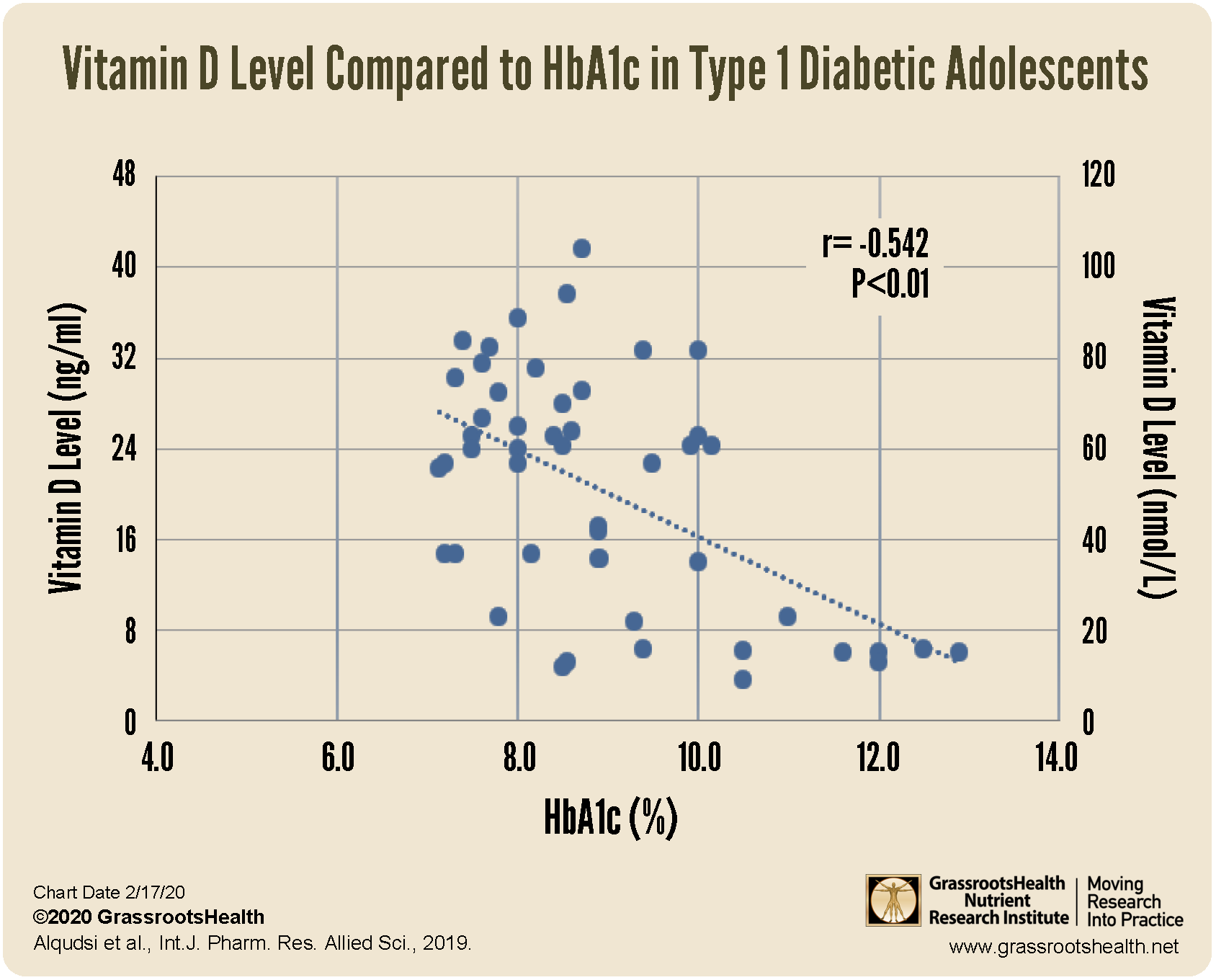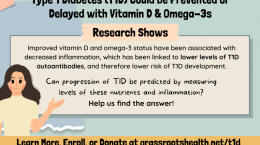Published on February 18, 2020
 Many research studies have demonstrated a direct link between vitamin D, inflammation, and autoimmune diseases, especially Type 1 Diabetes (T1D). It is therefore not surprising that individuals who receive a diagnosis of T1D are also more likely to be deficient in vitamin D.
Many research studies have demonstrated a direct link between vitamin D, inflammation, and autoimmune diseases, especially Type 1 Diabetes (T1D). It is therefore not surprising that individuals who receive a diagnosis of T1D are also more likely to be deficient in vitamin D.
A recent study by Alqudsi et al. looked at a group of adolescents in Saudi Arabia to determine the relationship between vitamin D levels and the incidence of T1D. They enrolled 98 participants age 12 to 18 years old; 49 had been diagnosed with T1D, and 49 healthy adolescents with matching ages, genders, and ethnicity were used as the control group. All participants received blood testing for total vitamin D, fasting blood glucose, and HbA1c.
What is Hemoglobin A1c (HbA1c)?
Hemoglobin A1c, or HbA1c, is the compound formed in the blood when a hemoglobin molecule in a red blood cell binds with a glucose molecule; the resulting molecule is also known as glycated hemoglobin. The more glucose that enters the bloodstream, the higher the amount of HbA1c. Measuring the percentage of HbA1c in the blood provides information about the average blood glucose levels over the prior few months. Generally, levels below 5.7% are considered normal, 5.7% to 6.4% are considered pre-diabetic, and levels of 6.5% or higher are considered diabetic.
What did the study find?
This study found that those with a T1D diagnosis had an average vitamin D level of 19.8 ng/ml (49.5 nmol/L) which was significantly lower than those without T1D who had an average level of 27.2 ng/ml (68 nmol/L). Also observed was an inverse, linear correlation between the HbA1c values and vitamin D levels (as shown in the chart below) and between fasting blood glucose and vitamin D levels for those with T1D. Both were statistically significant within the T1D group; there was no correlation in the control group.
Help Enroll Those at Risk for T1D
Because of the important association between vitamin D and T1D, GrassrootsHealth and the Children with Diabetes Research Foundation launched a project in July 2018, the D*action Type 1 Diabetes Prevention project. Evidence such as the study above suggests a role of vitamin D (and omega-3s) in possibly reversing or stopping progression from developing islet cell autoantibodies (such as IAA, GADA, IA-2A, ZnT8, and ICA) to a T1D diagnosis. While there have been several published trials and case studies on this topic, the D*action field trial may help demonstrate the effect even further. Please help us enroll those at risk of T1D by sharing this information today!
Reduce Your Risk of Chronic Disease
Make sure you know your vitamin D level, and take steps to keep it within a target of 40-60 ng/ml or 100-150 nmol/L! Through GrassrootsHealth Nutrient Research Institute, you can also test your essential elements magnesium, copper, zinc and selenium, toxins such as lead, mercury and cadmium, as well as your omega-3 levels, inflammation levels and thyroid stimulating hormone (TSH) level. Find out your levels today! Log on to the test selection page (click the link below) to get your tests and see for yourself if your levels can be improved.
Make sure you track your results before and after, about every 6 months!
How can I track my nutrient intake and levels over time?
To help you track your supplement use and nutrient levels, GrassrootsHealth has created the Personal Health Nutrient Decision System called
For each specific supplement, you can track what days you take it, how much, and many other details. This will help you know your true supplemental intake and what patterns of use work for you to reach and maintain optimum nutrient levels. Check it out today!








